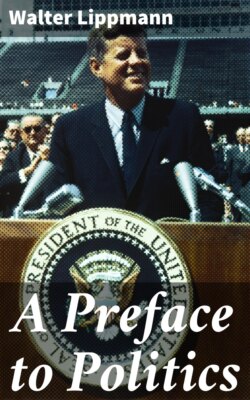A Preface to Politics

Реклама. ООО «ЛитРес», ИНН: 7719571260.
Оглавление
Walter Lippmann. A Preface to Politics
A Preface to Politics
Table of Contents
"A God wilt thou create for thyself. out of thy seven devils."
INTRODUCTION
A PREFACE TO POLITICS
CHAPTER I
ROUTINEER AND INVENTOR
CHAPTER II
THE TABOO
CHAPTER III
THE CHANGING FOCUS
CHAPTER IV
THE GOLDEN RULE AND AFTER
CHAPTER V
WELL MEANING BUT UNMEANING: THE CHICAGO. VICE REPORT
CHAPTER VI
SOME NECESSARY ICONOCLASM
CHAPTER VII
THE MAKING OF CREEDS
CHAPTER VIII
THE RED HERRING
CHAPTER IX
REVOLUTION AND CULTURE
Отрывок из книги
Walter Lippmann
Published by Good Press, 2019
.....
Only recently have we begun to see that the "political ring" is not something confined to public life. It was Lincoln Steffens, I believe, who first perceived that fact. For a time it was my privilege to work under him on an investigation of the "Money Power." The leading idea was different from customary "muckraking." We were looking not for the evils of Big Business, but for its anatomy. Mr. Steffens came to the subject with a first-hand knowledge of politics. He knew the "invisible government" of cities, states, and the nation. He knew how the boss worked, how he organized his power. When Mr. Steffens approached the vast confusion and complication of big business, he needed some hypothesis to guide him through that maze of facts. He made a bold and brilliant guess, an hypothesis. To govern a life insurance company, Mr. Steffens argued, was just as much "government" as to run a city. What if political methods existed in the realm of business? The investigation was never carried through completely, but we did study the methods by which several life and fire insurance companies, banks, two or three railroads, and several industrials are controlled. We found that the anatomy of Big Business was strikingly like that of Tammany Hall: the same pyramiding of influence, the same tendency of power to center on individuals who did not necessarily sit in the official seats, the same effort of human organization to grow independently of legal arrangements. Thus in the life insurance companies, and the Hughes investigation supports this, the real power was held not by the president, not by the voters or policy-holders, but by men who were not even directors. After a while we took it as a matter of course that the head of a company was an administrative dummy, with a dependence on unofficial power similar to that of Governor Dix on Boss Murphy. That seems to be typical of the whole economic life of this country. It is controlled by groups of men whose influence extends like a web to smaller, tributary groups, cutting across all official boundaries and designations, making short work of all legal formulæ, and exercising sovereignty regardless of the little fences we erect to keep it in bounds.
A glimpse into the labor world revealed very much the same condition. The boss, and the bosslet, the heeler--the men who are "it"--all are there exercising the real power, the power that independently of charters and elections decides what shall happen. I don't wish to have this regarded as necessarily malign. It seems so now because we put our faith in the ideal arrangements which it disturbs. But if we could come to face it squarely--to see that that is what sovereignty is--that if we are to use human power for human purposes we must turn to the realities of it, then we shall have gone far towards leaving behind us the futile hopes of mechanical perfection so constantly blasted by natural facts.
.....